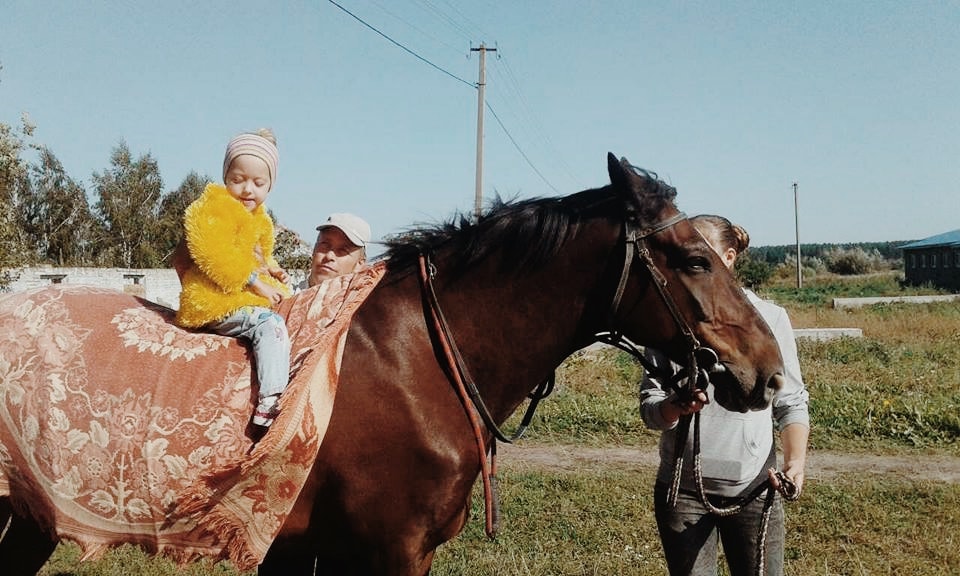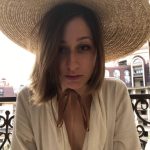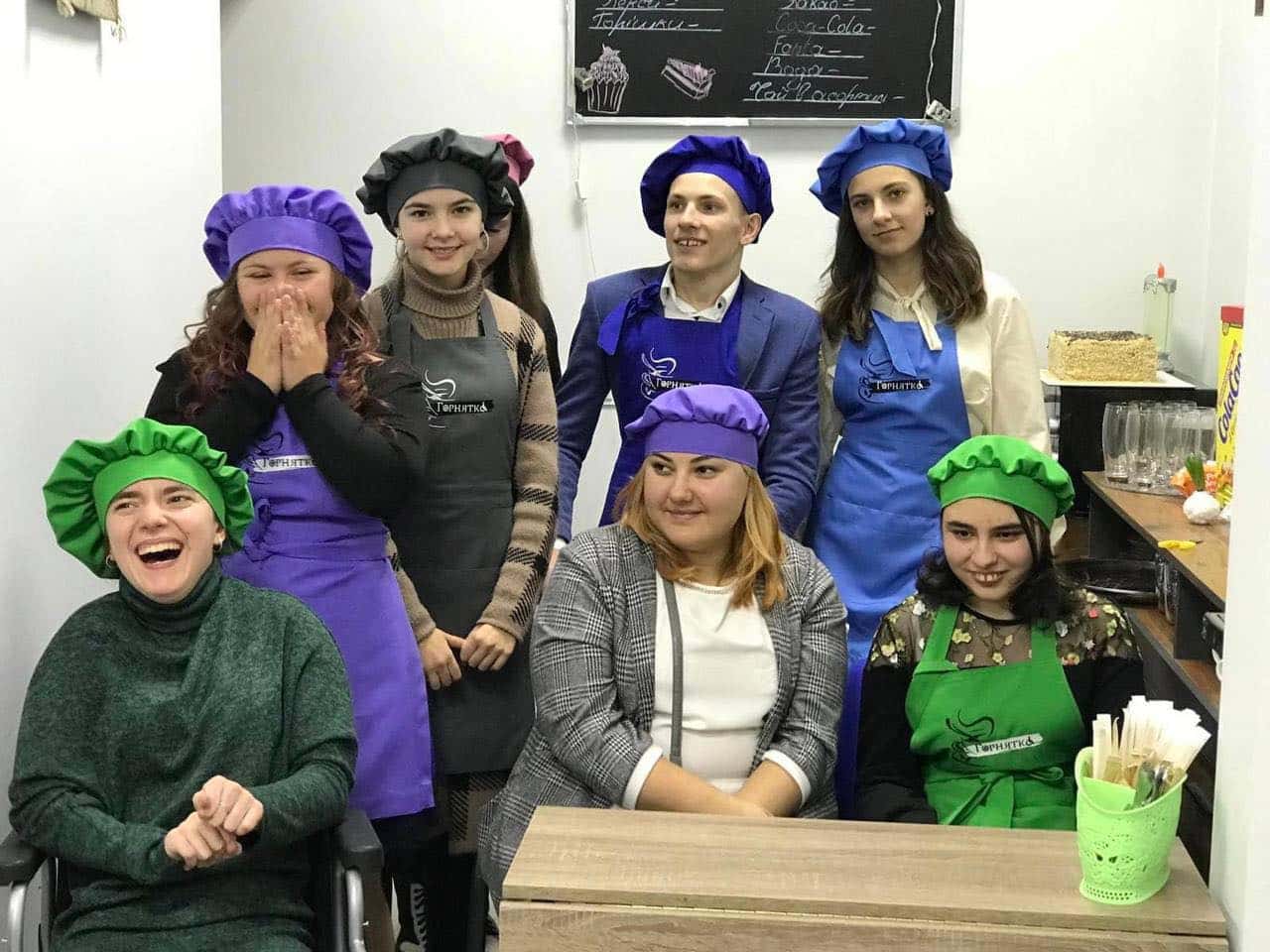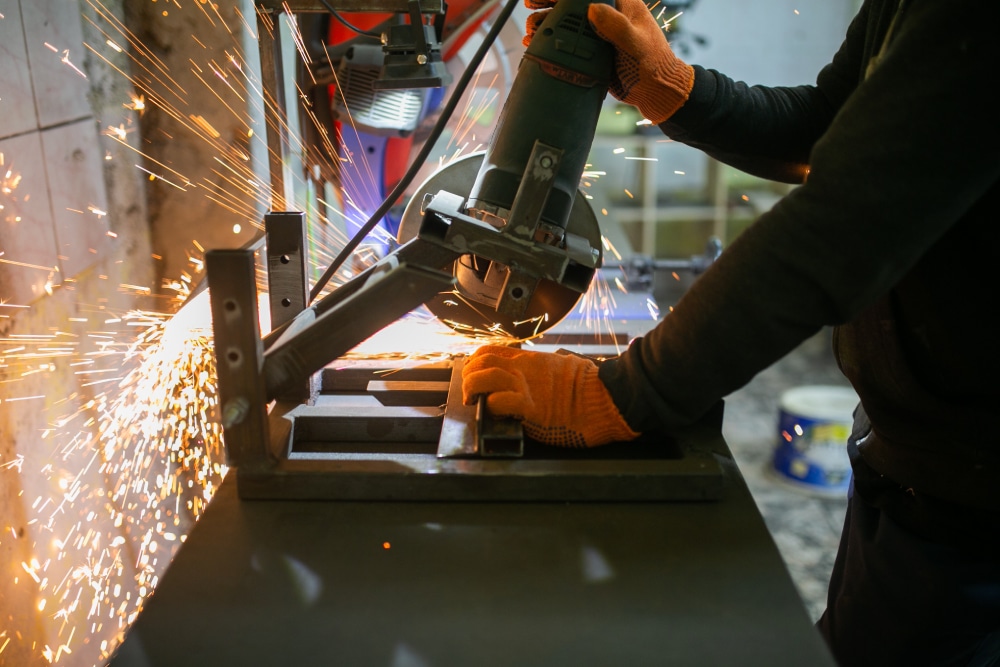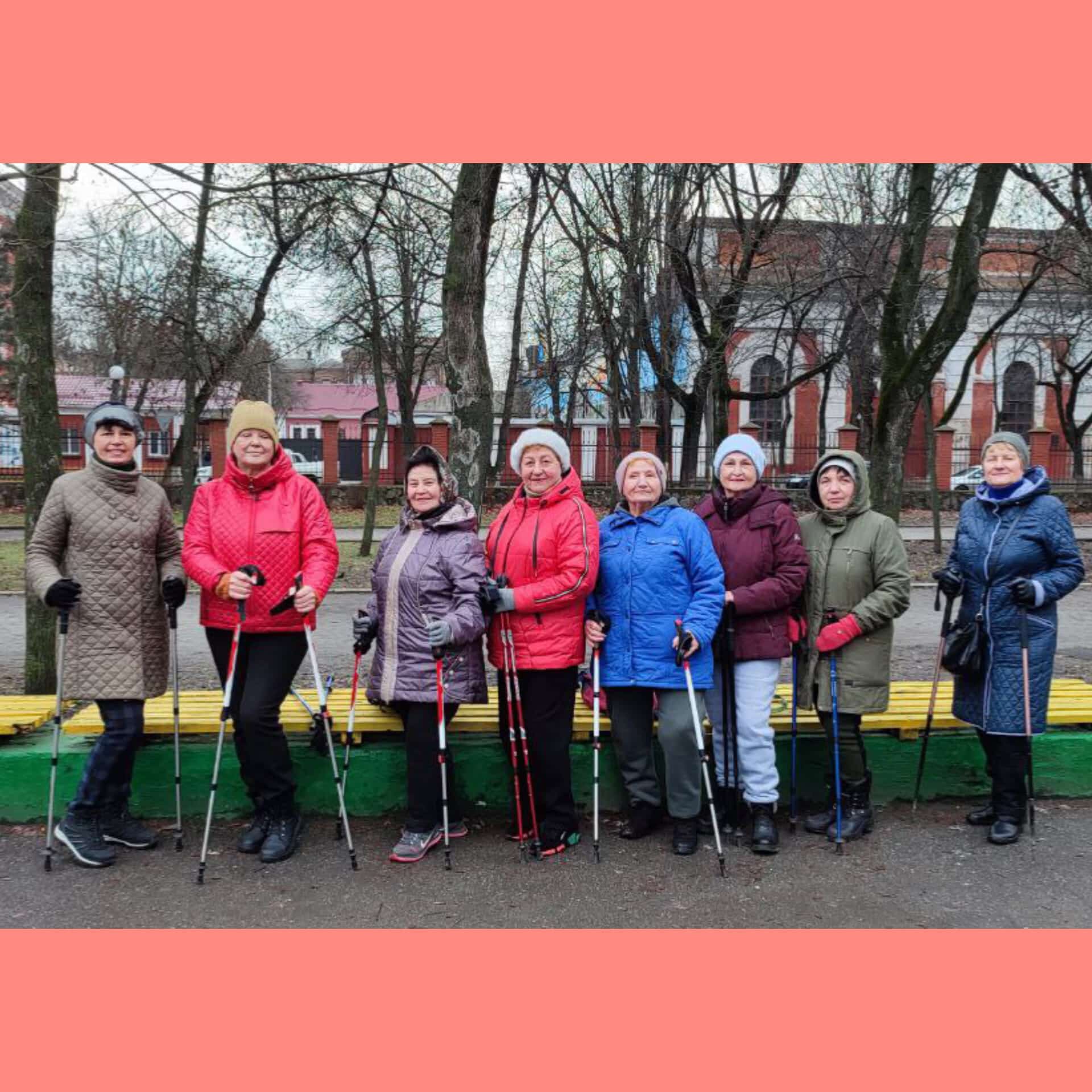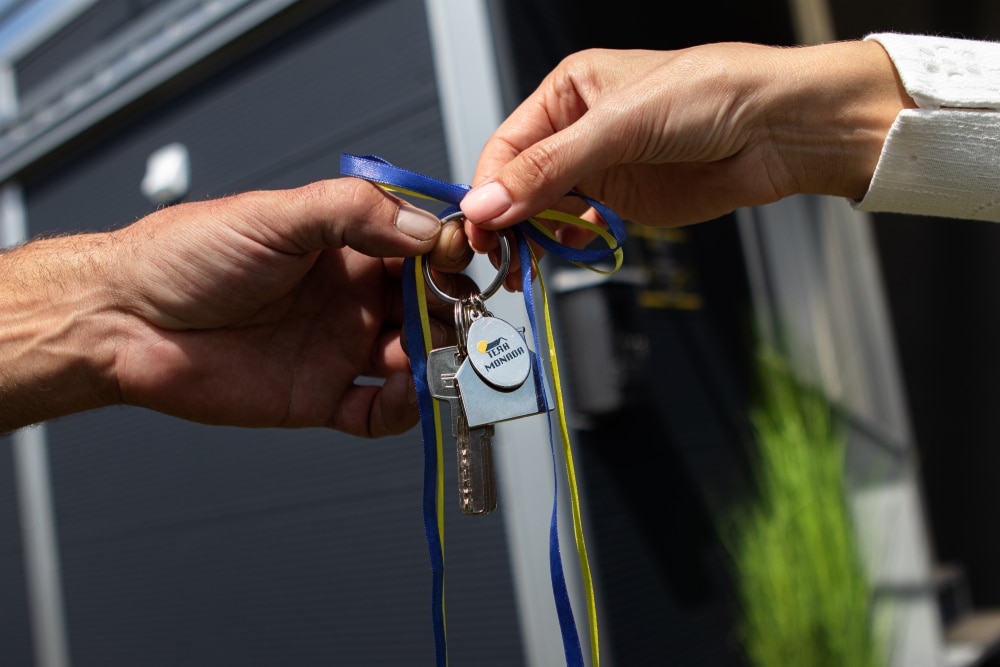During 6 years of its existence the center for equine-assisted therapy ‚Romashka’ (the Ukrainian for ‚camomile’ – editor’s note) has managed to put lots of kids with disabilities on their legs and to help them speak again all thanks to the decision made by their parents to fulfill their dream of generating funds for building the center by their own efforts.
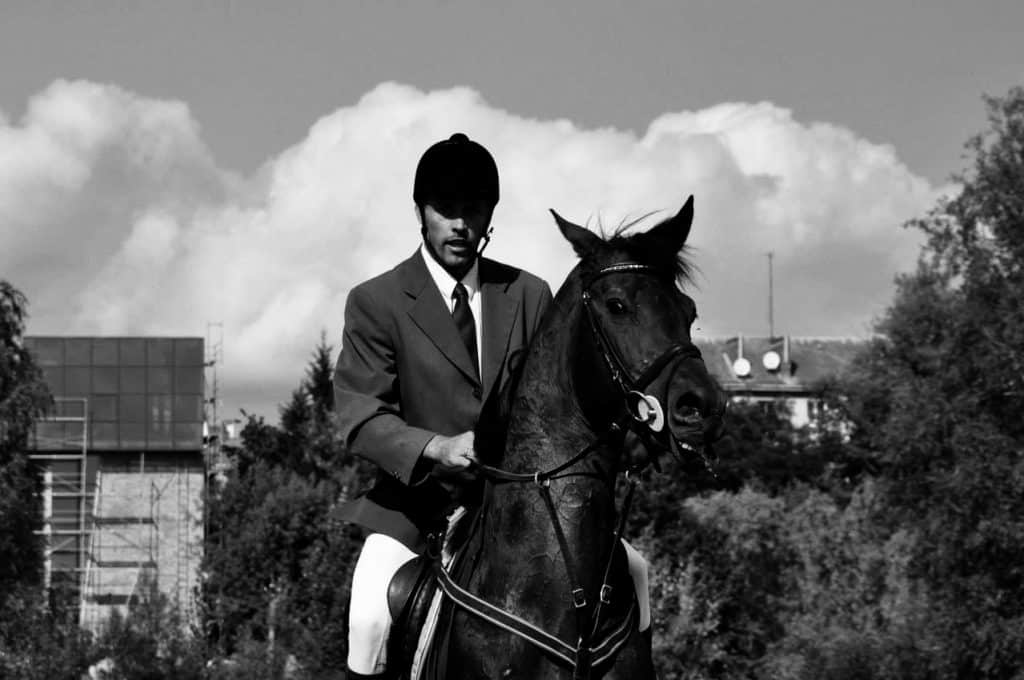
Yarusyk
‚Can you see Volodya over there? Yarusyk (a boy’s name – editor’s note) can stand on his own. He couldn’t do that back in December’, says his mom Diana joyfully, spotting his son by the shoulders.
Her 3-year-old son staggers a bit while leaning on Diana with his fingers buried in her thick hair.
The woman smiles and takes the child in her arms.
Diana and her family live in Lutsk (a city in western Ukraine – editor’s note). Together with her husband she brings four children up.
Teaching Yarusyk to at least stand without anyone else’s assistance was tantamount to boarding a spacecraft. The boy was born with cerebral palsy, dysplasia and double hemiplegia, which is the most difficult form of cerebral palsy. Because of this illness his limbs do not function well. It is also the cause of his stunted growth.
Some of his muscles, which are responsible for locomotion, such as crawling and coordination of movements, did not function. It was the reason why the boy has not been able for a long period of time to independently sit, crawl, stand or walk.
In search of help his parents have been to dozens of hospitals, diagnostic and rehabilitation centers where they have been advised to ‚launch‘ the boy’s muscles with the help of massages and physical therapy exercises. For two years his parents were trying to make his muscles work to no avail.
‚The doctors then said that they needed to conduct surgery on his hip joint to treat its dislocation. It was as if they were reconstructing his skeleton, they would break his bones in order to piece them together again and to clamp them with special plates. Operation is difficult and you have to deal with lots of pain and stress afterwards. One would have to spend a month in plaster and face a long rehabilitation process. Nobody gave as cast-iron guarantees. There was a chance that his bones would be set properly. If not, then a second, third, fifth operation would be needed’, says Diana.
The boy’s parents learned about equine-assisted therapy from a doctor. It is the kind of treatment received when riding a horse under the supervision of an occupational therapist.
It may help those groups of internal muscles work that otherwise cannot be reached by massage or a rehabilitation therapist. Moreover, the posture of a child during therapy sessions makes it possible to locate their legs just like with the help of special orthopedic devices. It is easier to do a complex of exercises and improve blood circulation while assuming this posture.
Yarusyk now visits the center for equine-assisted therapy ‚Romashka’ every month. The occupational therapist named Volodymyr and a mare Hardy wait for him there. During his first therapy session the boy was sitting uncomfortably on the mare and slept through the whole thing.
After a year of sessions not only could Yarusyk sit independently, but he was also able to stand.
‚Every time we went to ‚Romashka‘ our top priority was to put our son on his legs and avoid an operation at all costs. After 6 months of sessions the doctors told us that there was no need for such an operation anytime soon. We want to get documented evidence of it – we are going to visit our orthopedist soon’, says Yarusyk’s mother.
Yarusyk is one of dozens of children with disabilities who were put on their legs, on the saddle or who were helped to speak in the center for equine-assisted therapy ‚Romashka‘, located in the village of Vyshniv close to Lutsk. It was built six years ago through the joint efforts of the people who cared. Over this time it has become a place of hope and miracles for many a parent.
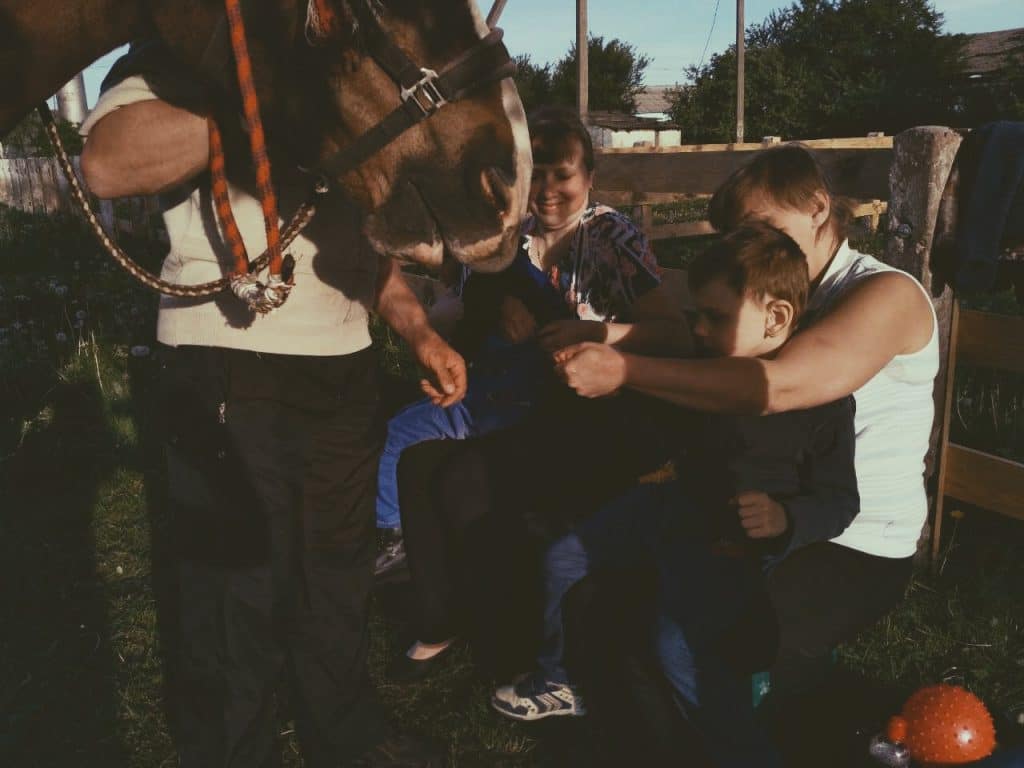
Money from all over the world
The hippotherapist, Volodymyr Maruniak, moved to the region of Volyn (the north-western part of Ukraine – editor’s note) from Khmelnytskyi (a city in western Ukraine – editor’s note) where he had been engaged in professional equestrian sports for many years. He had also learned the fundamentals of equine-assisted therapy in Kyiv. For some time Volodymyr worked at the equestrian club ‚Volyn‘ located in the village of Vyshniv. He taught kids the elements of equestrian sports while also holding equine-assisted therapy sessions. His fellow villager Olia would also visit his equestrian lessons. They subsequently got married.
In 2014 Volodymyr was called up to join the army. Having returned home, the parents of the children with disabilities decided to launch the center for equine-assisted therapy, since no such centers had existed in Volynska or Rivnenska oblast. Even though they were in great need back then. Those parents whose kids were already having sessions with Volodymyr saw the progress and they wanted them to keep doing that. However, there was no place (or horses) where these sessions could be held.
It was then that the most proactive of the parents established a public organization ‚Sylni dity‘ (the Ukrainian for ‚Strong children‘ – editor’s note) headed by Snizhana Avramuk.
Each of them took a lead on some parts of organizational work: someone dealt with legal matters, someone with documentation, some parents were promoting the idea and raising funds.
‚Our biggest concern was money. We had to find a plot of land and buy out premises located on it. The territory had to be vast so that horses could walk there. It was also important to provide children with quietness, clean air and silence because they are often frightened by loud sounds’, says Volodymyr.
The parents found an ideal spot in the village of Vyshniv. There was a plot of land with dilapidated barns on it.
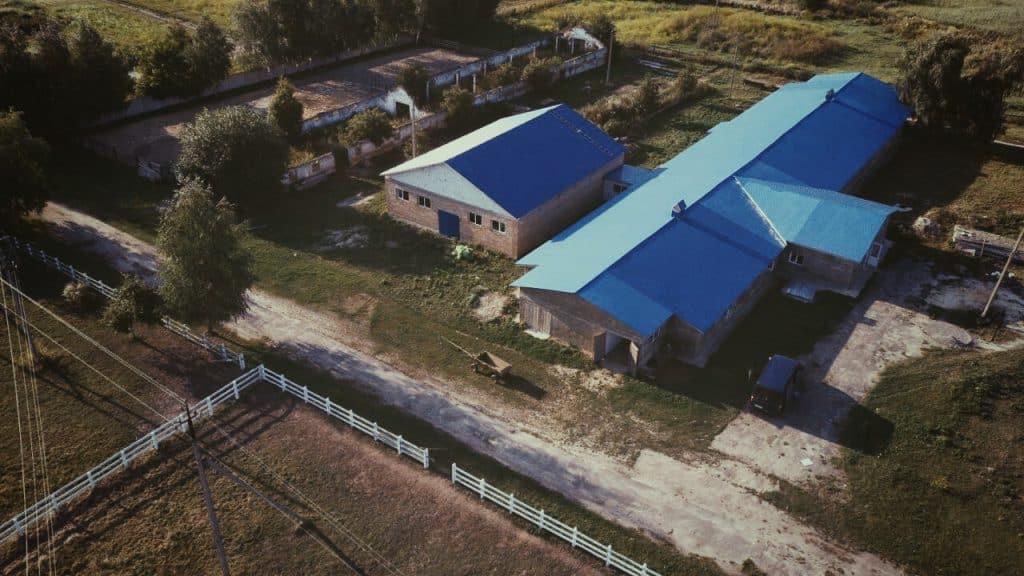
The land was purchased with the financial assistance of a benefactor who does not wish to be named. Prior to acquisition he had spoken to the parents of the children with disabilities and he felt for them, since he also has friends whose kids have health concerns.
The money for the opening of the center was raised by joint efforts through organization of donations. Everyone who could help joined the initiative.
For instance, money was also raised at schools. Some of the parents of the public organization ‚Sylni dity‘ are teachers who spread the word about the construction of the center at their schools.
Charitable fairs were organized with pastry and sweets on sale. One of the members of the public organization, Svitlana Kosynets, was selling at auction the pictures drawn by her son who has cerebral palsy.
A friend of one of the mothers of the organization, who is a manicure master, donated part of her earnings to the opening of the center. A concert was organized in one of the coffee shops in Lutsk in order to raise money for ‚Romashka‘.
Special boxes for donations were installed in lots of shops. Charitable art projects were held and photo sessions were raffled off. A local network of coffee shops donated one Hryvnia earned on each cup of coffee for the construction of the center.
The parents were also managing a Facebook page ‘Sylni dity’. There they announced different fundraising campaigns and initiatives while also reporting on the donations they received. They also created a separate page called ‚Charitable Fair ‚Romashka‘ which they used to sell handmade staff produced by different masters who decided to join the cause.
Apart from financial assistance, other people were also contributing to the campaign with everything they could: tiles, bricks and other construction materials. Someone offered discounts and someone would give stuff for free. The parents were renovating the old premises all by themselves.
During the day Volodymyr was working with kids and at nighttime he worked at the construction site. Despite weariness he was driven by unbridled enthusiasm.
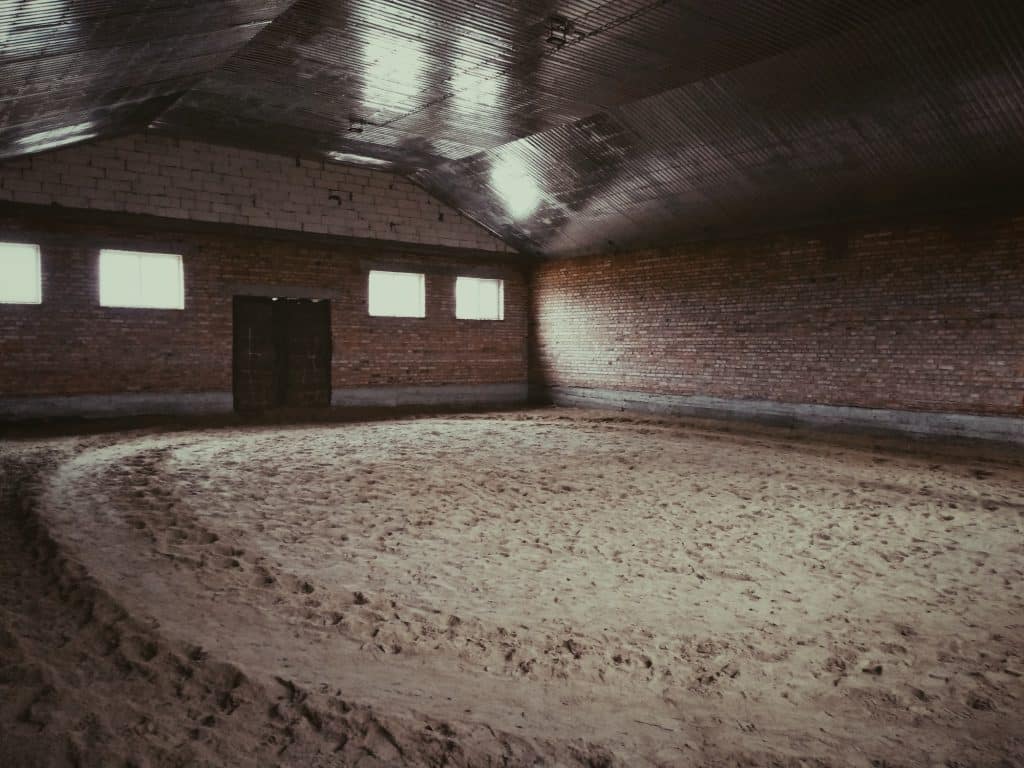
Indoor ring, kids’ space and shower for horses
In the place of the decayed barns a centre for equine-assisted therapy emerged.
It was called ‚Romashka’ as a tribute to the first mare that Volodymyr used while holding equine-assisted sessions in the equestrian club ‚Volyn‘ whose owner he was. The mare has helped many kids.
The parents launched a separate fundraising campaign with a view to buying Romashka out and taking her to the center since the kids had grown accustomed to her. First, the kids would ride the mare but eventually she got old and she is now mainly used for agricultural work: she delivers forage or other small cargos within the center’s premises.
As of now the center has its own indoor ring, stables, changing rooms, toilet facilities and a kids’ space with toys. It has also been connected to mains electricity and the water system. The center is heated with space heaters.
One of the special things about the center is the shower of horses.
‚We wash our horses since they work with kids and therefore have to be clean. We wash them with kids’ shampoos so their skin does not come out in a rash afterwards.‘, says Olia. She’s now helping her husband in the center by preparing the horse for a session in the indoor ring and also by walking it there.
Currently only the mare Hardy is used for the sessions. It was presented to the center by Volodymyr’s colleagues from his previous job. Recently the center has also purchased a horse called Maliuk (the Ukrainian for ‚a toddler‘ – editor’s note) with its own money. The horse is now being prepared for working with kids, which means Hardy will have a companion.
Selecting a horse for equine-assisted therapy requires masterful skills. The horse has to be calm, non-aggressive and it shouldn’t be afraid of loud sounds.
‚Till final victory‘
The center currently provides help for 30 children. It cannot help more kids since it is quite outcome-oriented. With only one occupational therapist available, it is obvious that human resources are limited.
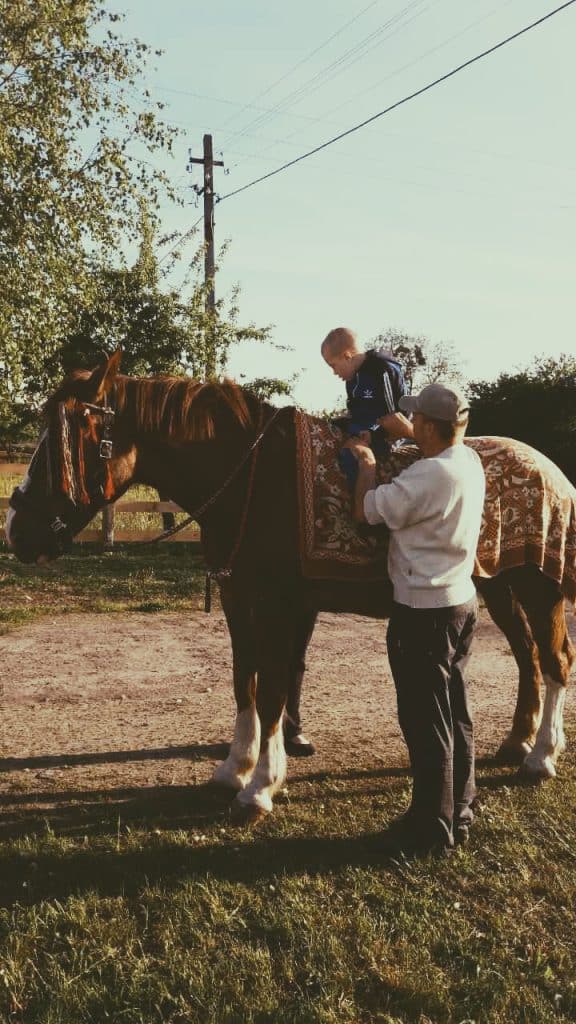
The children are treated ‚till final victory‘, i.e. unless there’s a positive result. Such a result may look different for each kid: some parents are happy when their child takes the first step while others are jubilant at their kid managing to sleep a tiny bit while riding a horse. (There are children who have difficulties sleeping and equine-assisted therapy helps them drop off easily.) In general, it all depends on the child’s diagnosis.
Prior to agreeing to work with a kid, Volodymyr asks for a medical certificate or diagnosis. He also has to make sure that there are no contraindications for equine-assisted therapy. One of such contraindications may be hydrocephalus, microcephaly, epilepsy and scoliosis of the 3rd degree.
The youngest of them is Alevtina who was admitted to the center when she was only 1,8 months old. Normally, the staff prefer to work with children of 2 years and upward. The oldest patient that has undergone treatment at the center was a 22-year-old. According to Volodymyr, it is better to start receiving therapy starting from 12-14 years. Adolescents are more supple and it is much easier for them to do physical exercises.
Each session lasts for 30 minutes every week. It is important that children not grow annoyed with it and that the break is long enough so that they can miss their horse. In this case, they will be eager to participate in the sessions.
It may also happen that children close their eyes or ears with their hands during the first sessions. Volodymyr has adopted his own methods: sometimes to divert the kids’ attention he asks them to count the horse’s ears or legs. He has also come up with a nice task – the kids are supposed to count spiders on the ceiling. This is especially useful since in order to lift their heads and look up children need to flex their muscles. He also tells them fairy tales.
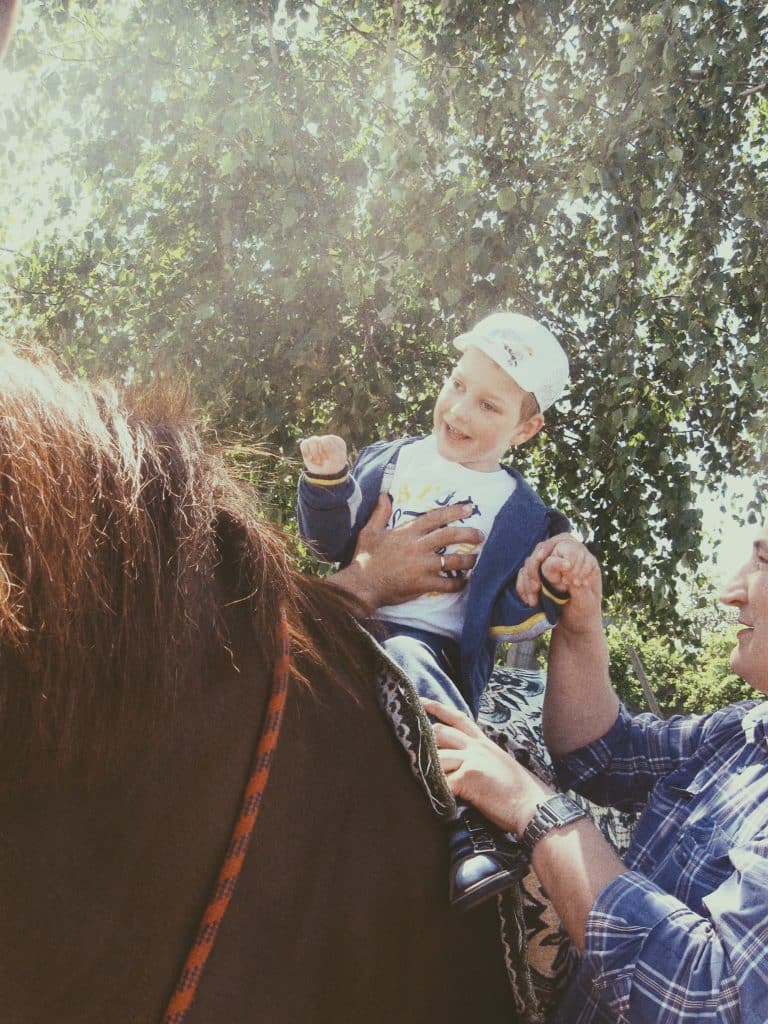
Olia constantly joins her husband in the work at the center by walking horses while Volodymyr conducts therapy sessions.
It is Olia’s task to control the horse’s steady pace during the sessions. Should the horse walk faster, the kid will be shaking in the saddle. A slower pace is also undesirable. Her task is to feel both the child and the horse.
All sessions are tailored to the needs of concrete children. While riding a horse they do different exercises, they move, bend over and lay down on the horse. In order to remain in the saddle they need to keep a balance and it is then that their muscles tense and become stronger.
‚We are happy for them as if they were our own kids‘
‚When children make at least some progress we are happy for them as if they were our own kids. This means that our work is not in vain’, says Volodymyr.
The center can boast many success stories. At times more progress is made than planned. Some parents would come to the center because they wanted their child to be able to at least sit. In the end their child starts to walk.
The 22-year-old Serhiy suffered from spastic tetraparesis, which is a dysfunction of arms and legs. He also had developmental speech delay and he could only walk while being supported by another person.
After a 5-year-course of equine-assisted therapy sessions he started walking independently and now he can even make it all the way up to the fifth floor by himself. The truth be told, to do that he needs his cane, but not his mom’s help any more.
‚Mothers often get back from their maternity leave when their child turns three years of age. Serhiy’s mother did so when he was 22. She says she got a new lease of life after Serhiy had been put on his legs’, says Volodymyr.
‚Sometimes they bring children who do not speak. While riding a horse they start speaking either out of fear or because of all the positive emotions and excitement. In some of the cases, when children were hoisted up on the saddle, they uttered their first words. Their parents were elated’, says Olia.
One of Volodymyr’s sweetest memories from work was when a girl spoke her very first word ‚Vova‘ (the short form for ‚Volodymyr‘ – editor’s note). She could not even sit independently when she was first brought to the center. Now she can speak and even walk.
‚Emotions are our remuneration‘
The central cannot afford to hire new employees which is why the couple has to clean its premises up, wash the toilet facilities and even prepare the horses for sessions. They work without any days off, because when there are no sessions with children there is constantly some other work at the center – cleaning up, delivering forage or taking care of the horses.
‚Emotions or our remuneration. We get an energetic boost from our kids and our work. But it’s worth it. Especially when you see the positive result after kids get better,‘ says Olia.
She works for free and her husband is for the time being financially assisted by the benefactor who had helped to buy the premises out. However, the assistance will be delivered temporarily and on condition that Volodymyr will find another source of income.
Volodymyr slogs away at the center: he’s knowledgeable in veterinary medicine, he takes care of the horses, he also performs the functions of a counselor when needed.
At the moment the center is functioning independently. It is supported financially by token payments made by parents for each session. The fee is the same for everyone.
In order to raise at least some funds, ‚Romashka’ takes care of mainly sport horses that are brought to the center.
Also guided tours of the center have sometimes been organized for school children. Its program featured an excursion, a riding and photo session and a quick meal. The fee was 50 UAH per visitor (approximately 1,80 USD – editor’s note).
Money is then spent on forage or other essential household items.
‚Not his clients, but the reason to live’
As of now the center charges a standard fee which is affordable to anyone. The couple is not planning to raise it because some of the parents will simply stop visiting the center as they will not be able to afford the sessions.
After acquaintances of Volodymyr learned about how much he makes, they offered him to work abroad. With his broad knowledge he would quickly find a good job. However, he turned that offer down. People often do not understand his reasoning and keep asking him the same question, ‚What do you do that for?‘. His answer is simple though,
‚I have already said that I would never give our kids up for any other country’.
He says he can’t live without his work and without kids. Although he works without any days off and despite his meager salary he has no intention whatsoever of giving up on his job. Quite the reverse. He is ready to move forward and to rejoice at the victories of every child. For him these are not mere working hours or tasks. Children are not his clients, they are the reason to live.
He gets back home late at night. His watch shows 10 PM. Exhausted he sinks into his armchair and thinks of having a short rest but then his mobile phone rings. Volodymyr is always contactable. The mother of one of his patients is overcome with emotions – her daughter has been able to walk for the first time!
Parents always share the victories of their children with Volodymyr.
At dinner he tells Olia the news. They recall the girl’s first sessions, her excitement and all of her victories, small as though they might have been.
‚Volodymyr always keeps saying ‚our kids‘. And he is right‘, smiles Olia. ‚They are indeed our kids and we have got lots of them now‘.

